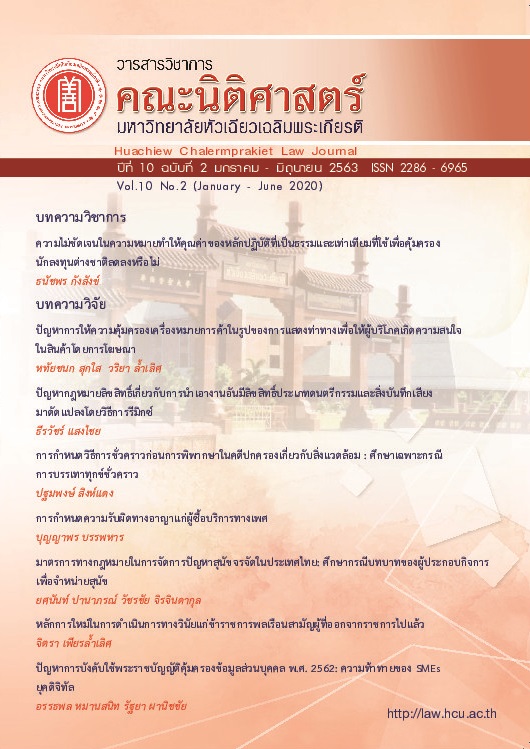การกำหนดวิธีการชั่วคราวก่อนการพิพากษาในคดีปกครองเกี่ยวกับสิ่งแวดล้อม : ศึกษาเฉพาะกรณีการบรรเทาทุกข์ชั่วคราว
บทคัดย่อ
การวิจัยครั้งนี้มีวัตถุประสงค์เพื่อศึกษาวิธีการชั่วคราวก่อนการพิพากษาในคดีปกครองเกี่ยวกับสิ่งแวดล้อม เพื่อวิเคราะห์ปัญหาและเสนอแนะแนวทางแก้ไขปัญหาเกี่ยวกับวิธีการชั่วคราวก่อนการพิพากษาที่เหมาะสมกับคดีปกครองเกี่ยวกับสิ่งแวดล้อมไทย จากการศึกษาพบว่า การกำหนดวิธีการชั่วคราวก่อนการพิพากษา โดยเฉพาะกรณีการบรรเทาทุกข์ชั่วคราวในคดีปกครองเกี่ยวกับสิ่งแวดล้อม มีปัญหาสำคัญ 5 ประการ ได้แก่ การกำหนดการบรรเทาทุกข์ชั่วคราวโดยศาล เงื่อนไขในการพิจารณาคำสั่งกำหนดการบรรเทาทุกข์ชั่วคราว อำนาจของตุลาการในการพิจารณาคำสั่งกำหนดการบรรเทาทุกข์ชั่วคราว ผลผูกพันต่อบุคคลภายนอกของคำสั่งกำหนดการบรรเทาทุกข์ชั่วคราว และการใช้สิทธิอุทธรณ์โต้แย้งคำสั่งกำหนดบรรเทาทุกข์ชั่วคราว ซึ่งเกิดจากสาเหตุ 3 ประการ ได้แก่ หลักเกณฑ์ของการบรรเทาทุกข์ชั่วคราวมิได้มีการบัญญัติไว้เป็นการเฉพาะ ศาลปกครองมักยึดติดกับกระบวนการพิจารณาคดีปกครองโดยทั่วไปซึ่งเป็นกระบวนการพิจารณาที่ถูกกำหนดเพื่อความยุติธรรมระหว่างคู่กรณีเท่านั้น จึงคำนึงถึงแต่สิทธิหน้าที่และผลกระทบระหว่างคู่กรณีทั้งสองฝ่ายในคดี โดยมิได้คำนึงถึงลักษณะเฉพาะของคดีปกครองเกี่ยวกับสิ่งแวดล้อมที่ส่งผลกระทบต่อสิ่งแวดล้อม และกฎหมายไม่ได้ให้สิทธิของคู่กรณีในการใช้สิทธิอุทธรณ์โต้แย้งได้อย่างเต็มที่
ผู้วิจัยเสนอให้มีการบัญญัติกฎเกณฑ์ของการบรรเทาทุกข์ชั่วคราวในคดีปกครองเกี่ยวกับสิ่งแวดล้อมให้ชัดเจน ควรมีการบัญญัติกฎหมายให้ตุลาการเจ้าของสำนวนเป็นผู้มีอำนาจในการกำหนดคำสั่งบรรเทาทุกข์ชั่วคราว และบัญญัติให้คำสั่งกำหนดการบรรเทาทุกข์ชั่วคราวมีผลต่อบุคคลภายนอกที่เป็นเอกชนผู้ประกอบการได้โดยตรง รวมถึงการบัญญัติให้สิทธิการอุทธรณ์โต้แย้งคำสั่งบรรเทาทุกข์ชั่วคราวทั้งในกรณีที่เป็นคุณและเป็นโทษให้แก่คู่กรณี
ดาวน์โหลด
เผยแพร่แล้ว
รูปแบบการอ้างอิง
ฉบับ
ประเภทบทความ
สัญญาอนุญาต
บทความหรือข้อความคิดเห็นใด ๆ ที่ปรากฏในวารสารฉบับนี้เป็นวรรณกรรมของผู้เขียนโดยเฉพาะ คณะนิติศาสตร์มหาวิทยาลัยหัวเฉียวเฉลิมพระเกียรติ และกองบรรณาธิการไม่มีส่วนรับผิดชอบหรือไม่จำเป็นต้องเห็นด้วยกับข้อคิดเห็นนั้น แต่ประการใด








